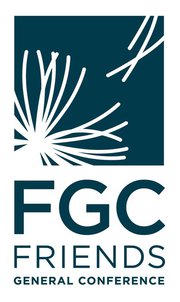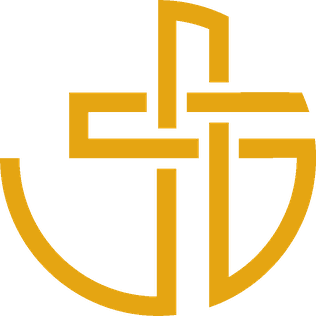
Friends General Conference (FGC) is an association of Quakers in the United States and Canada made up of 16 yearly meetings and 12 autonomous monthly meetings. "Monthly meetings" are what Quakers call congregations; "yearly meetings" are organizations of monthly meetings within a geographic region. FGC was founded in 1900.

Friends United Meeting (FUM) is an association of twenty-six yearly meetings of the Religious Society of Friends (Quakers) in North America, Africa, and the Caribbean. Its home pages states that it is "a collection of Christ-centered Quakers, embracing 34 yearly meetings and associations, thousands of local gatherings and hundreds of thousands of individuals". In addition there are several individual monthly meetings and organizations that are members of FUM; FUM's headquarters is in Richmond, Indiana, with offices in Kisumu, Kenya. Friends United Meeting is a member of the National Council of Churches in the United States of America, and is a global member of the World Council of Churches.
The views of Quakers around the world towards homosexuality encompass a range from complete celebration and the practice of same-sex marriage, to the view that homosexuality is sinfully deviant and contrary to God's intentions for sexual expression. The Religious Society of Friends (Quakers) is a historically Christian religious movement founded in 17th-century England; it has around 350,000 members. In Britain, Canada, New Zealand and Australia, many Quakers are supportive of homosexual relationships, while views are divided among U.S. meetings. Many Conservative Friends and Holiness Friends, both of which have retained traditional Quaker practices such as plain dress, along with Evangelical Friends, view homosexual acts as sinful. 49% of Quakers live in Africa, and though views may differ, the Kenyan Church of Friends does not support homosexual relationships.
The International Lutheran Council (ILC) is a worldwide association of confessional Lutheran denominations. Member bodies of the ILC hold "an unconditional commitment to the Holy Scriptures as the inspired and infallible Word of God and to the Lutheran Confessions contained in the Book of Concord as the true and faithful exposition of the Word of God." The member church bodies are not required to be in church-fellowship with one another, though many of them are.

Evangelical Friends Church International (EFCI) is a branch of the Society of Friends (Quaker) yearly meetings located around the world. This branch makes up most Evangelical Quaker meetings from the Gurneyites.

There are about 180,000 members of the Religious Society of Friends, or Quakers, in Africa. African Friends make up around 49% of Friends internationally, the largest proportion on any one continent. Kenya has the largest number of Quakers in a single nation—about 119,000 in the year 2017. The three main denominations of Friends, Friends United Meeting, Friends General Conference, and Evangelical Friends Church International, all have affiliated Yearly Meetings (associations) in Africa. There are also independent meetings in several African nations.

Yearly Meeting is an organization composed of constituent meetings or churches of the Religious Society of Friends, or Quakers, within a geographical area. The constituent meetings are called Monthly Meetings in most of the world; in England, local congregations are now called Area Meetings, in Australia Monthly Meetings are called Regional Meetings. "Monthly" and "Yearly" refer to how often the body meets to make decisions. Monthly Meetings may be local congregations that hold regular Meetings for Worship, or may comprise a number of Worship Groups. Depending on the Yearly Meeting organization, there may also be Quarterly Meetings, Half-Yearly Meetings, or Regional Meetings, where a number of local Monthly Meetings come together within a Yearly Meeting.
The Ireland Yearly Meeting is the umbrella body for the Religious Society of Friends in Ireland. It is one of many Yearly Meetings (YM's) of Friends around the world.
The Friends World Committee for Consultation (FWCC) is a Quaker organisation that works to communicate between all parts of Quakerism. FWCC's world headquarters is in London. It has General Consultative NGO status with the Economic and Social Council of the United Nations since 2002. FWCC shares responsibility for the Quaker UN Office in Geneva and New York City with the American Friends Service Committee and Britain Yearly Meeting.

Conservative Friends are members of the Wilburite branch of the Religious Society of Friends (Quakers). In the United States, Conservative Friends belong to three Yearly Meetings: the Ohio Yearly Meeting (Conservative), the North Carolina Yearly Meeting (Conservative), and the Iowa Yearly Meeting (Conservative). Of these, the Ohio Yearly Meeting is the most traditional. English Friends affiliated with the Conservative branch of Quakerism are organized as the Friends in Christ and tend to use the terms Primitive or Plain.
A meeting for worship is what the Religious Society of Friends call their church service. Different branches of Friends have different types of meetings for worship. A meeting for worship in English-speaking countries typically lasts an hour.

Quakers are people who belong to the Religious Society of Friends, a historically Protestant Christian set of denominations. Members refer to each other as Friends after John 15:14 in the Bible, and originally, others referred to them as Quakers as the founder of the movement, George Fox, told a judge to quake "before the authority of God". The Friends are generally united by a belief in each human's ability to be guided by the inward light to "make the witness of God" known to everyone. Quakers have traditionally professed a priesthood of all believers inspired by the First Epistle of Peter. They include those with evangelical, holiness, liberal, and traditional Quaker understandings of Christianity, as well as Nontheist Quakers. To differing extents, the Friends avoid creeds and hierarchical structures. In 2017, there were an estimated 377,557 adult Quakers, 49% of them in Africa followed by 22% in North America.

The Quaker movement began in England in the 17th Century. Small Quaker groups were planted in various places across Europe during this early period. Quakers in Europe outside Britain and Ireland are not very numerous (2023) although new groups have started in the former Soviet Union and successor countries. By far the largest national grouping of Quakers in Europe is in Britain. As of 2017, there were around 32,100 Quakers (Friends) in Europe.

Quakers are members of a Christian religious movement that started in England as a form of Protestantism in the 17th century, and has spread throughout North America, Central America, Africa, and Australia. Some Quakers originally came to North America to spread their beliefs to the British colonists there, while others came to escape the persecution they experienced in Europe. The first known Quakers in North America arrived in the Massachusetts Bay Colony in 1656 via Barbados, and were soon joined by other Quaker preachers who converted many colonists to Quakerism. Many Quakers settled in the Colony of Rhode Island and Providence Plantations, due to its policy of religious freedom, as well as the British colony of Pennsylvania which was formed by William Penn in 1681 as a haven for persecuted Quakers.

Central Yearly Meeting of Friends is a yearly meeting of Friends (Quaker) churches located in Indiana, North Carolina, Arkansas, and Ohio. Central Yearly Meeting of Friends is a part of the Gurneyite wing of the Orthodox branch of Quakerism, and is aligned with the conservative holiness movement. Meeting for worship is programmed and led by pastors.

The World Communion of Reformed Churches (WCRC) is the largest association of Reformed (Calvinist) churches in the world. It has 230 member denominations in 108 countries, together claiming an estimated 80 million people, thus being the fourth-largest Christian communion in the world after the Catholic Church, Eastern Orthodox Church, and the Anglican Communion. This ecumenical Christian body was formed in June 2010 by the union of the World Alliance of Reformed Churches (WARC) and the Reformed Ecumenical Council (REC).
Bundelkhand Yearly Meeting is a yearly meeting of the Religious Society of Friends in the Bundelkhand region of Madhya Pradesh state in mid-India. It was formed from Friends Churches set up by missionaries from Ohio Yearly Meeting in 1896, and the first independent yearly meeting was held in Chhatarpur in 1956. Theologically it falls within the evangelical tradition, unlike nearby Mid-India Yearly Meeting.

Gurneyite is a branch of the Religious Society of Friends, or Quakers. The name originates from sympathy with the ideas of Joseph John Gurney (1788-1847), an English Quaker minister. Gurneyites came about in the 1840s during the second schism in Quakerism. In general, Gurneyite Quakers follow evangelical Christian doctrines on Jesus Christ, the Atonement, and the Bible.








